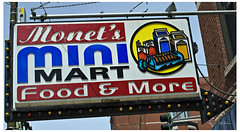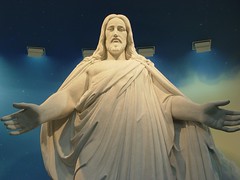AP Lit Semester 1 Flashcards
Terms : Hide Images [1]
| 5435664334 | allegory | a story, poem, or picture that can be interpreted to reveal a hidden meaning, typically a moral or political one. |  | 0 |
| 5435664335 | antithesis | a person or thing that is the direct opposite of someone or something else. |  | 1 |
| 5435666847 | ambiguity | uncertainty or inexactness of meaning in language. |  | 2 |
| 5435669357 | undertone | an underlying quality or feeling. |  | 3 |
| 5435669358 | antecedent | a thing or event that existed before or logically precedes another. |  | 4 |
| 5435672446 | metonymy | the substitution of the name of an attribute or adjunct for that of the thing meant.. |  | 5 |
| 5435674446 | parallelism | the use of successive verbal constructions in poetry or prose that correspond in grammatical structure, sound, meter, meaning, etc. |  | 6 |
| 5435676170 | synecdoche | a figure of speech in which a part is made to represent the whole or vice versa |  | 7 |
| 5435680146 | kennings | a compound expression in Old English and Old Norse poetry with metaphorical meaning, e.g., oar-steed = ship |  | 8 |
| 5435680147 | caesura | (in Greek and Latin verse) a break between words within a metrical foot. (in modern verse) a pause near the middle of a line. |  | 9 |
| 5435683445 | alliteration | the occurrence of the same letter or sound at the beginning of adjacent or closely connected words. |  | 10 |
| 5435762801 | allusion | an expression designed to call something to mind without mentioning it explicitly; an indirect or passing reference. |  | 11 |
| 5435765296 | symbol | a thing that represents or stands for something else, especially a material object representing something abstract. |  | 12 |
| 5435767927 | elegy | a poem of serious reflection, typically a lament for the dead. |  | 13 |
| 5435769953 | eulogy | a speech or piece of writing that praises someone or something highly, typically someone who has just died. |  | 14 |
| 5435771681 | patronymic | a name derived from the name of a father or ancestor, typically by the addition of a prefix or suffix, e.g., Johnson, O'Brien, Ivanovich. |  | 15 |
| 5435774155 | thane | (in Anglo-Saxon England) a man who held land granted by the king or by a military nobleman, ranking between an ordinary freeman and a hereditary noble. |  | 16 |
| 5435776328 | enjambment | (in verse) the continuation of a sentence without a pause beyond the end of a line, couplet, or stanza. |  | 17 |
| 5435778396 | scansion | the action of scanning a line of verse to determine its rhythm. the rhythm of a line of verse. |  | 18 |
| 5435781645 | Zeitgeist | the defining spirit or mood of a particular period of history as shown by the ideas and beliefs of the time. |  | 19 |
| 5435797529 | personification | the attribution of a personal nature or human characteristics to something nonhuman, or the representation of an abstract quality in human form. |  | 20 |
| 5435797530 | juxtaposition | the fact of two things being seen or placed close together with contrasting effect. |  | 21 |
| 5435800534 | volta | Italian word for "turn." In a sonnet, the volta is the turn of thought or argument: in Petrarchan or Italian sonnets it occurs between the octave and the sestet, and in Shakespearean or English before the final couplet. |  | 22 |
| 5435800535 | paradox | The term Paradox is from the Greek word "paradoxon" that means contrary to expectations, existing belief or perceived opinion. It is a statement that appears to be self-contradictory or silly but may include a latent truth. |  | 23 |
| 5435803940 | euphony | from the Greek word "euphonos" that means sweet-voiced. It can be defined as the use of words and phrases that are distinguished as having a wide range of noteworthy melody or loveliness in the sounds they create. |  | 24 |
| 5435803941 | cacophony | the use of words with sharp, harsh, hissing and unmelodious sounds primarily those of consonants to achieve desired results. |  | 25 |
| 5435807177 | epithet | a descriptive literary device that describes a place, a thing or a person in such a way that it helps in making the characteristics of a person, thing or place more prominent than they actually are. Also, it is known as a by-name or descriptive title. |  | 26 |
| 5435807178 | satire | a technique employed by writers to expose and criticize foolishness and corruption of an individual or a society by using humor, irony, exaggeration or ridicule. It intends to improve humanity by criticizing its follies and foibles. |  | 27 |
| 5435819557 | Gothic | a style of writing that is characterized by elements of fear, horror, death, and gloom, as well as romantic elements, such as nature, individuality, and very high emotion. |  | 28 |
| 5436090389 | onomatopoeia | a word, which imitates the natural sounds of a thing. It creates a sound effect that mimics the thing described, making the description more expressive and interesting. |  | 29 |
